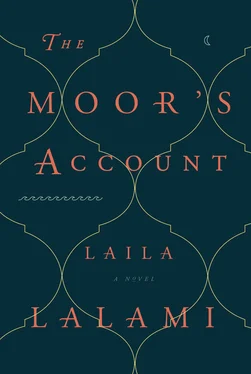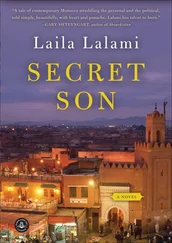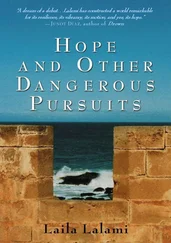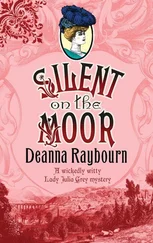Albaniz, the governor called.
In addition to being the official notary of the expedition, charged with the safekeeping of all its contracts and petitions, Señor Albaniz was also responsible for chronicling its progress for the next few months. His presence at this moment, our first encounter with an Indian nation, made me think of my father, who had dreamed of me becoming, like him, a notary public, a witness and recorder of major events in other people’s lives. I felt as though my father’s aspiration, which I had so easily and so carelessly brushed off many years ago, would never let go of me, that I would be reminded of it wherever I went, even here, in this strange land. But perhaps my father’s dreams for me have come true in the end, for here I am setting down, for my own reasons, a relation of the Narváez expedition.
Tell the savages, the governor said, to take me to Apalache. He considered it beneath him to speak directly to the Indians.
With the look of a servant who has found himself chosen for a tedious chore, Señor Albaniz dismounted and stepped forward. This, he said, pointing behind him, is Pánfilo de Narváez, the new governor of this terra firma, by virtue of the bequest made to him by his Holy Imperial Majesty. He wishes to go to the kingdom of Apalache and to meet with its leader in order to discuss matters of great importance to our nations. He wants you to take him there.
Whether the Indians did not understand the notary’s command or refused to comply with it, I could not guess. They remained silent. I looked for their leader, but I could not make out if it was the man who wore a headdress of stiff animal hair or the one who had the greatest number of tattoos.
Take us to the kingdom of Apalache, Señor Albaniz said, louder this time, his hands cupped around his mouth so that his voice could carry farther. One of the Indians sat on his haunches, enjoying the spectacle of this man in a metal costume and a feathered hat, crying and gesticulating before him.
Kingdom of Apalache! Señor Albaniz yelled again.
By then, the rafts had made another crossing, and more people disembarked — soldiers, settlers, servants, and captives. They joined our party without speaking; now we outnumbered the Indians.
You can stop, Albaniz, the governor said. He looked behind him. Bring me the captives.
The order was passed down, and a foot soldier brought forth the prisoners. Because I was always with my master, near the head of our long procession, I had not seen the prisoners since our departure from Portillo, the fishing village. They shuffled forward now, their hands bound by a length of rope that was tied to the soldier’s belt. Their bodies were crisscrossed by lash marks and their limbs thinned down by the smallest of all the rations. One of the prisoners bowed his head in a way that struck me as unnatural until I noticed the hole where his nose should have been. Snot and blood caked at the edges of the gap. Flies darted around him relentlessly, but he could not swat them because his hands were tied. I averted my eyes from the horror, feeling as if I were witnessing something I should never have seen.
The prisoners came to stand next to Señor Albaniz, who spoke directly to one of them. Pablo, he said. Tell them to take us to Apalache.
The man Señor Albaniz had called Pablo, a lad whose long, glossy hair had been sheared and whose shoulders were covered with blisters, commenced to speak in his mother tongue, but almost immediately a lance surged in the air from the Indian side and the foot soldier who had been holding him by the arm lurched forward and tumbled to the ground, clutching his throat. An arrow had gone through his neck, its tip coming out on the other side. The soldier opened his mouth wide, but the only sound that came out was the bubbling of the blood inside. Now the Indians let out great howling cries, cries that sparked in me a nearly paralyzing fear.
My God, Señor Albaniz said, turning around and looking for his horse.
Ándale! the governor shouted.
Señor Dorantes nudged his horse forward and I felt Abejorro’s tail swish across my chest as I turned to look for cover, though there was no place to hide. I tried to run back toward the river, but the crowd of Castilians who were moving forward pressed against me, their bodies bearing down on mine with such strength that I had no other choice but to sink to my knees. The air above me exploded with the sound of muskets. One of the soldiers next to me, a boy of no more than fifteen or sixteen years of age, raised his weapon and fired, but it was one of his own comrades who fell down. I could hear the Indian warriors advancing behind me, their unintelligible cries no longer in need of any translation.
Somehow, I made my way to a pack load, crates that held carpentry tools, and I cowered behind them. I would be safe here, I thought. Then I heard a labored grunt. Past a thicket of weeds on my left, not ten steps away from me, a settler was fighting an Indian. The settler had a trowel, which he was trying to land somewhere on the Indian. He missed. But the Indian’s aim was unswerving and when he brought his hatchet down, he severed the settler’s arm neatly at the elbow. Another blow to the head and the settler fell to the ground, eyes still open.
The Indian turned around, looking for another adversary. I flattened my back against the pack load. He seemed surprised when he saw me — a black man among white men. The color of my skin, so different from that of the others, made him pause. And I, as I said, had no weapon. He seemed unsure whether to leave me or kill me, but he decided on the latter, for he took a step forward with his hatchet raised. As he brought it down, I rolled to the side and he fell on top of me, his weight landing on my hip, his long hair falling on my eyes and blinding me. I could smell him — his sweat, his breathless anger, the snakeskin belt tied around his loins. We wrestled on the ground and I pressed the heel of my hand against his jaw, though my palm slipped against his hairless face. He punched me; I punched back. Still, he managed to right himself up and stand, with his hatchet drawn again. I thought my hour had come, but God willed that a stray musket ball brought him down. He fell forward and his hatchet grazed my leg, leaving a shallow cut along my shin. I cried out. I do not remember what I said, I imagine it was nothing at all, just a cry of relief at having survived the attack. Then I took the weapon by its handle and, trying to contain the fear inside me, I resolved to defend myself.
I raised myself upon my knees to peer over the stack of crates at the battlefield. Soldiers in armor were firing their crossbows and muskets, and the Indians were fighting back with their lances and arrows. Here and there, a few Indians had managed to inflict grievous harm — a Castilian in a rusty helmet tottered from his mount, his hands gripping the lance that had landed on his thigh; another had fallen from a slingshot strike — but more often, the Indians suffered injury. I remember that one of them, his bowels slipping out from his stomach, was holding on to himself with both arms. Another one screamed as a soldier straddled him and smashed his body with a mace.
I was not a man of arms and I knew nothing of battles, but I could see that this was not a fair match, that the Indians had no hope of winning. Soon, I found myself searching the dusty field for my master, the man to whom my mortal fate was tied. Where was he? Then I saw him, past the line of crossbowmen, riding on his horse. With his sword, he hacked an Indian on the shoulders until blood sprayed out from him. The man fell down to his knees, and Señor Dorantes trampled him as he moved on to the next. The other horsemen, too, had come upon the same solution; they crushed the Indians before them on the field in a savage stampede.
Читать дальше












